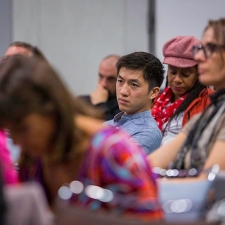'Veiling in the courtroom' research presentation
This event has taken place
View all upcoming events at Kingston University.
Time: 2.00pm - 3.00pm
Venue: Room JG1008, John Galsworthy building, Penrhyn Road campus, Penrhyn Road, Kingston upon Thames, Surrey KT1 2EE
Price:
free
Speaker(s): Dr Amy Leach

Dr Amy Leach, an associate professor in the Faculty of Social Science and Humanities at the University of Ontario Institute of Technology (Oshawa, Canada), will be presenting a talk on the research findings of her study exploring 'veiling in the courtroom'.
Dr Leach studies deception detection in forensic contexts. Most recently, she has focused on the detection of deception in vulnerable populations (such as children, non-native speakers). Dr Leach has also collaborated on projects in the areas of confessions and interrogations, wrongful convictions, and eyewitness identifications. She has received grants from the Social Sciences and Humanities Research Council of Canada and the American Psychology-Law Society, and her dissertation work was the recipient of both the Canadian Psychological Association Certificate of Excellence and the AP-LS Dissertation Award (first place). In addition to her research background, Dr Leach has the unique experience of having worked as a Canada Border Services Agency (CBSA) officer for four years. Thus, she has direct experience with the factors that affect forensic interviewing and decision-making.
There has been considerable international debate about the banning of face veils. Recently, judges in the UK and Canada ruled that women must remove their niqabs when testifying in court (R. v. N.S., 2010; The Queen v. D[R], 2013). One salient argument is that all members of the Court must be able to see a witness's face to assess her credibility (N.S. v. Her Majesty the Queen, et al., 2012). Yet, there is no empirical evidence to support this position. This presentation will focus on preliminary research on the effects of veiling in the courtroom. In the first study, 80 Muslim women who wore the niqab, the hijab, or did not veil were asked to lie or tell the truth about an event that they witnessed. We examined how veiling affected women's perceptions of testifying (such as difficulty, discomfort, credibility), and whether women would unveil in court. In the second study, 60 women lied or told the truth about an event after being randomly assigned to wear a hijab, a niqab, or remain unveiled. Then, we assessed Canadian (N = 90) and British (N = 90) observers' biases and abilities to detect their deceit. Theoretical and practical implications of this research will be discussed.
For further information about this event:
Contact: Basia Spalek
Email: b.spalek@kingston.ac.uk
Directions
Directions to Room JG1008, John Galsworthy building, Penrhyn Road campus, Penrhyn Road, Kingston upon Thames, Surrey KT1 2EE:
